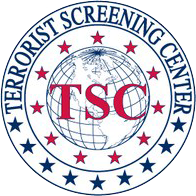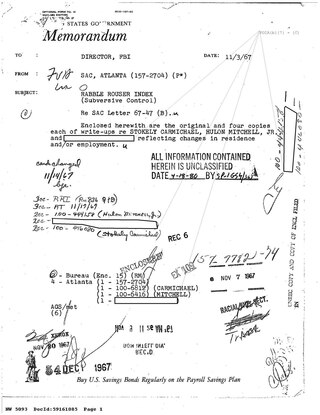Related Research Articles

Counterintelligence (counter-intelligence) or counterespionage (counter-espionage) is any activity aimed at protecting an agency's intelligence program from an opposition's intelligence service. It includes gathering information and conducting activities to prevent espionage, sabotage, assassinations or other intelligence activities conducted by, for, or on behalf of foreign powers, organizations or persons.
The Computer-Assisted Passenger Prescreening System is a counter-terrorism system in place in the United States air travel industry. The United States Transportation Security Administration (TSA) maintains a watchlist, pursuant to 49 USC § 114 (h)(2), of "individuals known to pose, or suspected of posing, a risk of air piracy or terrorism or a threat to airline or passenger safety." The list is used to pre-emptively identify terrorists attempting to buy airline tickets or board aircraft traveling in the United States, and to mitigate perceived threats.
The No Fly List, maintained by the United States federal government's Terrorist Screening Center (TSC), is one of several lists included in algorithmic rulesets used by government agencies and airlines to decide who to allow to board airline flights. The TSC's No Fly List is a list of people who are prohibited from boarding commercial aircraft for travel within, into, or out of the United States. This list has also been used to divert aircraft away from U.S. airspace that do not have start- or end-point destinations within the United States. The number of people on the list rises and falls according to threat and intelligence reporting. There were reportedly 16,000 names on the list in 2011, 21,000 in 2012, and 47,000 in 2013.

The Bureau of Diplomatic Security, commonly known as Diplomatic Security (DS), is the security branch of the United States Department of State. It conducts international investigations, threat analysis, cyber security, counterterrorism, and protection of people, property, and information. Its mission is to provide a safe and secure environment for officials to execute the foreign policy of the United States.

The Intelligence Reform and Terrorism Prevention Act of 2004 (IRTPA) is a 235-page Act of Congress, signed by President George W. Bush, that broadly affects United States federal terrorism laws. The act comprises several separate titles with varying subject issues. It was enacted in response to the terror attacks of September 11, 2001.

The National Crime Information Center (NCIC) is the United States' central database for tracking crime-related information. The NCIC has been an information sharing tool since 1967. It is maintained by the Criminal Justice Information Services Division (CJIS) of the Federal Bureau of Investigation (FBI) and is interlinked with federal, tribal, state, and local agencies and offices.

The National Counterterrorism Center (NCTC) is a United States government organization responsible for national and international counterterrorism efforts. It is based in Liberty Crossing, a modern complex near Tysons Corner in McLean, Virginia. NCTC advises the United States on terrorism.
A tide is the rise and fall of a sea level caused by the Moon's gravity and other factors.

Investigative Data Warehouse (IDW) is a searchable database operated by the FBI. It was created in 2004. Much of the nature and scope of the database is classified. The database is a centralization of multiple federal and state databases, including criminal records from various law enforcement agencies, the U.S. Department of the Treasury's Financial Crimes Enforcement Network (FinCEN), and public records databases. According to Michael Morehart's testimony before the House Committee on Financial Services in 2006, the "IDW is a centralized, web-enabled, closed system repository for intelligence and investigative data. This system, maintained by the FBI, allows appropriately trained and authorized personnel throughout the country to query for information of relevance to investigative and intelligence matters."
The Terrorist Screening Database (TSDB) is the central terrorist watchlist consolidated by the Federal Bureau of Investigation's Terrorist Screening Center and used by multiple agencies to compile their specific watchlists and for screening. The list was created after the September 11 attacks.
The Analysis Corporation (TAC) was the Intelligence Solutions business of Global Defense Technology & Systems, Inc. (GTEC), now Sotera Defense Solutions, a defense contracting company. Based in McLean, Virginia, it is a wholly owned subsidiary of Global Strategies Group Inc., the operating company of GTEC. From its inception in 1990 to its dissolution in 2012, TAC worked on projects in the counterterrorism and national security realm by supporting national watchlisting activities as well as other counterterrorism requirements.
The concept of border security in the United States shares a complex relationship with the persistent threat of terrorism. Border security includes the protection of land borders, ports, and airports. The relationship is unique in the sense that the federal government must constantly reevaluate and tweak its border security policy to address the perceived threats posed to the United States through the form of human terrorism or the smuggling and detonation of a weapon of mass destruction.

The President's Surveillance Program (PSP) is a collection of secret intelligence activities authorized by the President of the United States George W. Bush after the September 11 attacks in 2001 as part of the War on Terrorism. Information collected under this program was protected within a Sensitive Compartmented Information security compartment codenamed STELLARWIND.

The FBI Indexes, or Index List, was a system used to track American citizens and other people by the Federal Bureau of Investigation (FBI) before the adoption of computerized databases. The Index List was originally made of paper index cards, first compiled by J. Edgar Hoover at the Bureau of Investigations before he was appointed director of the FBI. The Index List was used to track U.S. citizens and others believed by the FBI to be dangerous to national security, and was subdivided into various divisions which generally were rated based on different classes of danger the subject was thought to represent.
The National Counter Terrorism Centre (NCTC) was a proposed federal anti-terror agency to be created in India, modelled on the National Counterterrorism Center of the US. The proposal arose after the 2008 Mumbai attacks a.k.a. 26/11 attacks where several intelligence and operational failures revealed the need for a federal agency with real time intelligence inputs of actionable value specifically to counter terrorist acts against India. The proposal has however met with much criticism from the Chief Ministers of various states who see this as a means of weakening India's federalism.

The practice of mass surveillance in the United States dates back to wartime monitoring and censorship of international communications from, to, or which passed through the United States. After the First and Second World Wars, mass surveillance continued throughout the Cold War period, via programs such as the Black Chamber and Project SHAMROCK. The formation and growth of federal law-enforcement and intelligence agencies such as the FBI, CIA, and NSA institutionalized surveillance used to also silence political dissent, as evidenced by COINTELPRO projects which targeted various organizations and individuals. During the Civil Rights Movement era, many individuals put under surveillance orders were first labelled as integrationists, then deemed subversive, and sometimes suspected to be supportive of the communist model of the United States' rival at the time, the Soviet Union. Other targeted individuals and groups included Native American activists, African American and Chicano liberation movement activists, and anti-war protesters.

Russell E. Travers is an American national security official who served as the deputy director of the National Counterterrorism Center (NCTC). Travers first took the role on November 13, 2017, and later became acting director. He resumed his duties as deputy on December 28, 2018, following Joseph Maguire's swearing in as NCTC director. Travers again became acting director on August 16, 2019, after Maguire became Acting Director of National Intelligence. He was dismissed on March 18, 2020.

Lora Shiao is an American intelligence officer serving as the chief operating officer of the Office of the Director of National Intelligence. She served as the Acting Director of National Intelligence from January 20, 2021 to January 21, 2021.
The Consular Lookout and Support System (CLASS) is a system supporting the U.S. Department of State Bureau of Consular Affairs: it assists in decisions for visa and passport issuance and helps establish a person's eligibility for overseas services. It is used by U.S. Department of State passport agencies and consular posts as well as U.S. Department of Homeland Security and other border inspection agencies to perform namechecks on visa and passport applicants to identify individuals who may be ineligible for issuance or require other special action. Potential reasons for ineligibility include past criminal or terrorist activity.
References
- ↑ "TERRORIST IDENTITIES DATAMART ENVIRONMENT (TIDE)" (PDF). Office of the Director of National Intelligence.
- ↑ "Terrorist Screening and Brady Background Checks for Firearms" (PDF). CRS. Retrieved 2016-06-17.
- ↑ "Tide Fact Sheet" (PDF). NCTC. Archived from the original (PDF) on 2010-08-31. Retrieved 2016-06-17.
- ↑ Justin Ling (21 June 2018). "Revealed: Canada uses massive US anti-terrorist database at borders". The Guardian.